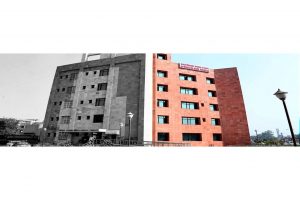National Consumer Disputes Redressal Commission (NCDRC): The Coram of Justice R.K. Agrawal (President) and Dr S.M. Kantikar (Member), upheld the State Commission’s Majority Order with regard to alleged medical negligence.
The instant revision petition was filed against the Order by the U.P. State Consumer Disputes Redressal Commission, Lucknow.
Complainant had visited the SS Hospital, Varanasi (OP 1) for pain in his left knee. OP 2 examined the patient and suggested Arthroscopic removal of the loose bodies. Complainant alleged that instead of Arthroscopy, OP 2 performed an open operation. Another X-Ray was taken, wherein it was found that the loose bodies were still present.
Later, the complainant underwent the Arthroscopy procedure at Mumbai by the hands of Dr Anant Joshi and gradually his left knee started functioning normally.
What was the complainant aggrieved of?
Aggrieved by the careless and negligent treatment of the OPs, the complainant filed the consumer complaint before the District Forum.
The District Forum allowed the complaint and ordered OPs to pay compensation of Rs 2,30,000 jointly and severally to the complainant.
Further, on an appeal being filed before the State Commission, OP’s were ordered to pay compensation of Rs 4,37,965 by the minority order but the majority order allowed the appeal and set aside the District Forum’s Order.
Again on being aggrieved by the State Commission’s Order, the instant revision petition was filed.
Analysis & Decision
Bench stated that it is an admitted fact that Dr S.C. Goel preferred open operation during the time of procedure instead of Arthroscopy.
As per the operative notes, it was the case of degenerative changes in the left knee joint and the four loose bodies were seen during Arthroscopy and their sizes were 1.5, 1.25, 1 & 1 cm. A large body of more than 5 mm size is difficult to be removed by Arthroscopy. Therefore, the Opposite Party No. 2 preferred open surgery. Moreover, admittedly, the patient before the operation was informed that if the Arthroscopy was not successful, open surgery would be done.
Hence, in view of the above, nothing amounts to negligence in the present matter.
The commission relied on the Supreme Court’s decision in Jacob Mathew, (2005) 6 SCC 1 wherein it was held that,
“When a patient dies or suffers some mishap, there is a tendency to blame the doctor for this. Things have gone wrong and, therefore, somebody must be punished for it. However, it is well known that even the best professionals, what to say of the average professional, sometimes have failures. A lawyer cannot win every case in his professional career but surely he cannot be penalized for losing a case provided he appeared in it and made his submissions.”
Coram held that Just because a person suffers a bad outcome from medical treatment, does not mean that they have an automatic right to sue for compensation.
A medical error is only considered “negligent” if the healthcare practitioner has failed to take “reasonable care”.
It was noted in the present case through the medical records of the patient that it was the patient’s misconception that despite the advice of Arthroscopy, OP 2 performed open surgery.
Hence, the State Commission’s Order had no jurisdictional error, or a legal principle ignored or miscarriage of justice. [Anil Kumar Gupta v. Banaras Hindu University, 2020 SCC OnLine NCDRC 462, decided on 05-10-2020]

